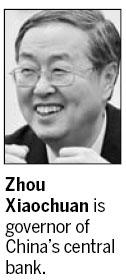BEIJING - Zhou Xiaochuan, China's central bank governor, pledged to remove domestic policy barriers to promote the yuan's use in cross-border trade settlements and outward investments by Chinese enterprises.
However, Zhou said the government does not have any predetermined goal for the currency's international position.
"The yuan is just a domestic currency instead of a hard currency broadly used in international trade and financial transactions," he said during an interview with a small group of media including China Daily in December.

"Chinese authorities insist that the requirement that only hard currencies can be used in international trade, investment and financial transactions needs to be abolished."
He said the government will remove relevant limits to make the yuan equivalent to other currencies, but the pace of its internationalization still lies in market selection.
The status of the yuan is mainly determined by the decisions of companies and individuals outside Chinese borders, said Zhou.
What the government can do is to encourage domestic businesses engaged in international trade and investment to use the yuan as a settlement currency, he added.
"We will rely more on the market to form our view about its future direction. Therefore, we do not have an established goal for the next five years."
In addition to reducing limits on using the yuan, the governor said foreign currency clearing and trade settlement systems also need to be gradually set up.
Since the global financial crisis, major economies including China and Russia have called for less dependence on the US dollar in international trade and investment, and accelerated steps to promote their own currencies on a global basis.
In April 2009, the State Council, China's Cabinet, decided to set up pilot projects in five cities to use the yuan for settlement of cross-border trade with Hong Kong, Macao and members of the Association of Southeast Asian Nations.
In June 2010, the State Council announced the expansion of the program to 20 provinces and cities.
On Jan 13 this year, the central bank put forward a pilot program to allow domestic companies to use the yuan to settle direct outbound investment for new ventures, mergers, acquisitions and stake purchases overseas. Companies participating in the trial program can send profits from such offshore investments in the yuan back to China.
The central bank has also increased currency swapping. Since December 2008, when China and the Republic of Korea reached a currency swap agreement worth 180 billion yuan ($27.3 billion), China has extended currency swaps with eight monetary authorities, with a combined value exceeding 803 billion yuan.
In August, the central bank opened yuan investment return channels by allowing foreign central banks, overseas clearing banks and participating banks of the yuan settlement of cross-border trade settlement program to participate in bond trading in China's inter-bank market.
On Dec 15, the yuan was directly traded abroad for the first time at Moscow's MICEX, viewed as a milestone on the way to the yuan's internationalization. The transaction volume reached 4.92 million yuan ($738,850) by the end of trading against the rouble.
Daily trading in the yuan has grown from zero to $400 million in the past few months as the currency of the world's second-largest economy begins to flow around the world, the Wall Street Journal reported.
An HSBC report released on Oct 29 showed that the willingness to use the yuan for settlement is growing among both domestic and international enterprises.
source:China Daily
Related News
Photos
More>>trade
market
finance
- Quarterly Statistics & Analysis of China s VC/PE Exits- Q1/2010
- Quarterly Statistics & Analysis of China's VC Investments- Q2/2010
- Quarterly Statistics & Analysis of China s VC/PE Fundraisings- Q1/2010
- Quarterly Statistics & Analysis of China s VC lnvestments- Q1/2010
- Quarterly Statistics & Analysis of China s PE Investments-Q1/2010





